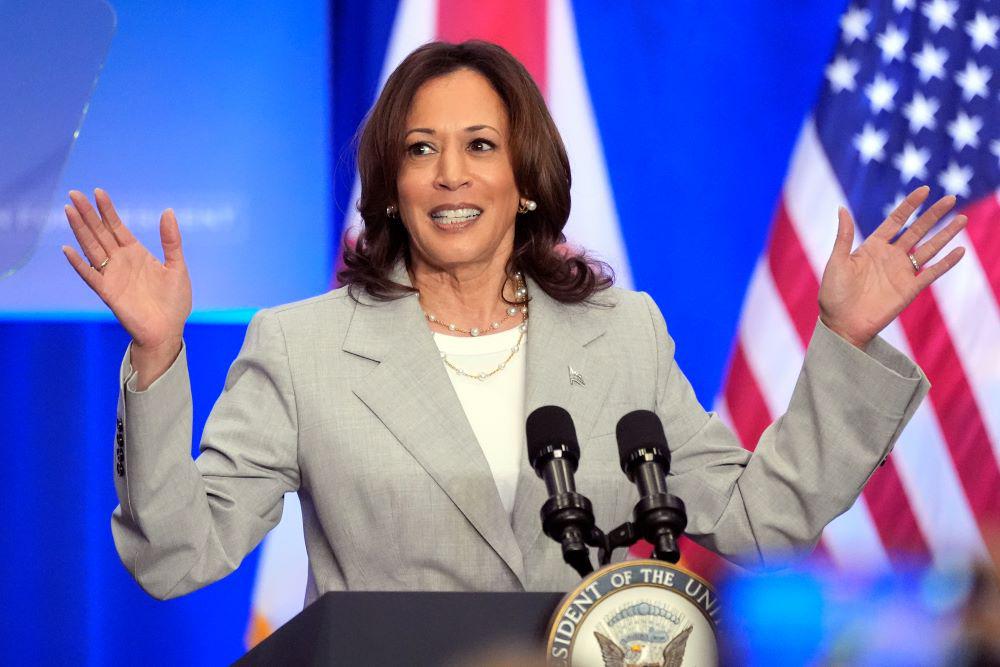
With President Biden’s decision not to run for a second term, the overwhelming likelihood is that the Democratic nominee will be Kamala Harris. That’s doubly true now that Biden has endorsed her.
In principle, it’s possible for the Democratic National Committee to come up with a process for an open convention. But Democrats are sick to death of being in this interminable limbo, where uncertainly about their nominee fragments the party, saps energy, and keeps the focus on their own weaknesses rather than where it should be—on the toxic craziness of Donald Trump. That’s the prime reason why the party will likely unite behind Harris, and fast.
A secondary reason is that passing over her would be an affront to any sitting vice president, and especially to a woman of African American and Asian American heritage. Even if an open convention could somehow find its way to an arguably stronger candidate such as Gretchen Whitmer (and there is no guarantee), the costs to party unity and another lost month of limbo and division would not be worth it.
So let’s assume that Harris is the nominee. How much better than Biden will she be?
I’ve never been much of a Harris fan. Her biography ought to add up to a coherent and compelling narrative, but in the past she hasn’t quite made it work. Her campaign for the nomination in 2020 badly fizzled. She was not even a favorite of African American voters.
In the first couple of years as Biden’s vice president, Harris had trouble finding her footing or her identity. Biden and his senior staff did not make that any easier by sticking her with impossible assignments such as solving the immigration crisis and winning enactment of the John Lewis Voting Rights Act.
Like any vice president, especially one so obviously in waiting to succeed her president, Harris has had a delicate balancing act between demonstrating unwavering loyalty and building up her own political persona. That balancing act is one reason sitting vice presidents seldom directly succeed presidents. The only one who achieved that feat in modern times other than via the death of a president was George H. W. Bush, and he failed to get re-elected.
But lately, Harris has been looking better. The Biden people finally gave her a mission in which she can really shine—reproductive rights, and she had been doing very well with it. Her speeches and campaign appearances have gotten more forceful and more effective.
As Harris molds her life story to fit a presidential candidacy, another big plus is her experience as a prosecutor, which gave liberals some pause. In the current context, that credential takes much of the Republican law-and-order story off the table, especially with Trump as a convicted felon.
As a former prosecutor, she is also an effective debater. As a senator, she was superb in skewering Supreme Court nominee Brett Kavanaugh and Attorney General William Barr. As a former prosecutor, she can counter Trump’s false claims that crime is increasing under Biden’s watch.
Against Trump, Harris will be a far more effective debater than Biden. At 59, she will represent youth against age, and Trump will be the geezer. She will represent coherence against reckless craziness, wit against bile. Harris is a far better spokesperson for the achievements of the Biden administration than Biden himself.
THE PRACTICAL QUESTION IS HOW HARRIS WOULD DO against Trump and Vance among crucial groups of voters and in key swing states.
One group is white working-class men, who have been deserting Democrats in droves. A second is the so-called emerging electorate of voters of color, young people, non-college educated, and single women. The third is the small group of true swing voters, especially suburban Republican-leaning women.
Onto this demographic analysis, we need to add the variable of turnout. Democrats have done better than projected in the last three elections because turnout on the Democratic side, especially among low voting propensity groups, beat traditional patterns.
And then we need to do the analysis state by state, because the election will come down to seven or eight swing states.
All things considered, Harris is more than viable, and she still has time to grow as a candidate.
With Trump sounding his usual sexist and racist themes, and Vance on the ticket as a fake economic populist, Harris will not be a great draw for white working-class male voters, a key demographic in the vital states of Michigan, Wisconsin and Pennsylvania. However, Harris will presumably energize Black voters. That would be a notable offset in Michigan, with large numbers of Black voters in Detroit, and likewise in Pennsylvania. In 2016, Hillary Clinton grossly underperformed in both states where her campaign failed to engage Black voters; she lost both states, and the election.
As noted, however, Harris did not notably excite Black voters in 2020, and she still has some work to do. A recent Newsweek poll showed her doing no better among Black voters than Biden. But if Harris can energize the Democrats’ African American base, which she is likely to do as the campaign progresses, that would put back in play two states that had widely been written off for a Biden candidacy, North Carolina and Georgia.
Enthusiasm among women is another potential offset. In 2016, Clinton ran such a weak campaign that she failed to carry even a majority of white women. This year, with Trump sounding even more sexist than in 2016, his conviction on 34 felony counts that grew out of his sexual liaison with a porn star, and reproductive rights being front and center, it would be astonishing if Harris did not boost female turnout and win a solid majority of women of all races.
For now, her approval rating, at around 38 percent, is only slightly better than Biden’s. Still, his disapproval rating is about six points higher. And in match-ups against Trump, polls show Harris about equal with Biden, and both underwater. But in terms of a Harris entry onto the mainstage, it’s very early days. With Biden still as presumptive nominee, we haven’t even seen Harris TV spots.
Two imponderables are how Harris would do with Hispanics and with Black men. Trump’s vicious attacks against Mexicans and his mass deportation plans should help bring the Latino vote back to Harris.
Her immigrant mother, cancer researcher Shyamala Gopalan Harris, is a plus. Trump’s crude nativism becomes a little harder to pull off with J.D. Vance married to Usha Chilikuri Vance, also of Indian heritage.
All things considered, Harris is more than viable, and she still has time to grow as a candidate. Her main liability is that she assumed her current job, not from having run a strong campaign in 2020, but because Biden needed a check-the-box candidate. Female, check. African-American, check.
To the extent that DEI fatigue afflicts more than far right voters, it’s up to Harris to prove that she is not an identity candidate but a powerful nominee in her own right. Harris will also benefit from the collective sigh of relief and the surge of party unity with Biden out of the race.


